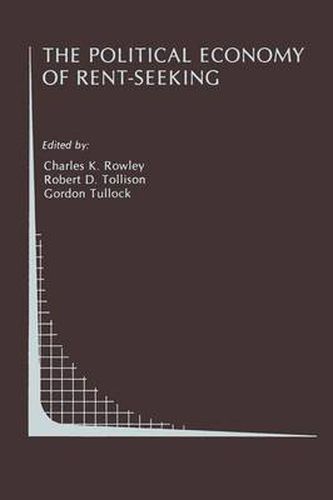Readings Newsletter
Become a Readings Member to make your shopping experience even easier.
Sign in or sign up for free!
You’re not far away from qualifying for FREE standard shipping within Australia
You’ve qualified for FREE standard shipping within Australia
The cart is loading…






This title is printed to order. This book may have been self-published. If so, we cannot guarantee the quality of the content. In the main most books will have gone through the editing process however some may not. We therefore suggest that you be aware of this before ordering this book. If in doubt check either the author or publisher’s details as we are unable to accept any returns unless they are faulty. Please contact us if you have any questions.
It is now twenty years since the concept of rent-seeking was first devised by Gordon Tullock, though he was not responsible for coining the phrase itself. His initial insight has burgeoned over two decades into a major research program which has had an impact not only on public choice, but also on the related disciplines of economics, political science, and law and economics. The reach of the insight has proved to be universal, with relevance not just for the democracies, but also, and arguably more important, for all forms of autocracy, irrespective of ideological com plexion. It is not surprising, therefore, that this volume is the third edited publication dedicated specifically to scholarship into rent-seeking behavior. The theory of rent-seeking bridges normative and positive analyses of state action. In its normative dimension, rent-seeking scholarship has expanded, enlivened, in some respects turned on its head, the traditional welfare analyses of such features of modern economics as monopoly, externalities, public goods, and trade protection devices. In its positive dimension, rent-seeking contributions have provided an important analy tical perspective from which to understand and to predict the behavior of politicians, interest groups and bureaucrats, the media and the academy within the political market place. This bridge between normative and positive elements of analysis is invaluable in facilitating an understanding of and evaluating the costs of state activity within a consistent paradigm.
$9.00 standard shipping within Australia
FREE standard shipping within Australia for orders over $100.00
Express & International shipping calculated at checkout
This title is printed to order. This book may have been self-published. If so, we cannot guarantee the quality of the content. In the main most books will have gone through the editing process however some may not. We therefore suggest that you be aware of this before ordering this book. If in doubt check either the author or publisher’s details as we are unable to accept any returns unless they are faulty. Please contact us if you have any questions.
It is now twenty years since the concept of rent-seeking was first devised by Gordon Tullock, though he was not responsible for coining the phrase itself. His initial insight has burgeoned over two decades into a major research program which has had an impact not only on public choice, but also on the related disciplines of economics, political science, and law and economics. The reach of the insight has proved to be universal, with relevance not just for the democracies, but also, and arguably more important, for all forms of autocracy, irrespective of ideological com plexion. It is not surprising, therefore, that this volume is the third edited publication dedicated specifically to scholarship into rent-seeking behavior. The theory of rent-seeking bridges normative and positive analyses of state action. In its normative dimension, rent-seeking scholarship has expanded, enlivened, in some respects turned on its head, the traditional welfare analyses of such features of modern economics as monopoly, externalities, public goods, and trade protection devices. In its positive dimension, rent-seeking contributions have provided an important analy tical perspective from which to understand and to predict the behavior of politicians, interest groups and bureaucrats, the media and the academy within the political market place. This bridge between normative and positive elements of analysis is invaluable in facilitating an understanding of and evaluating the costs of state activity within a consistent paradigm.